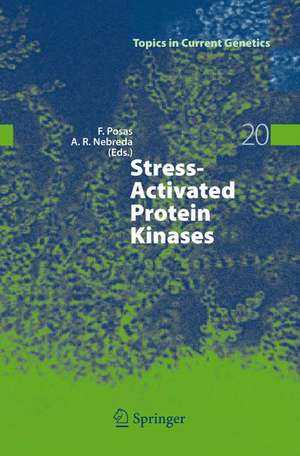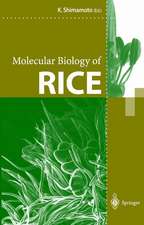Stress-Activated Protein Kinases: Topics in Current Genetics, cartea 20
Editat de Francesc Posas, Angel R. Nebredaen Limba Engleză Hardback – 10 ian 2008
In this book, leading researchers in the field discuss the state-of-the-art of many aspects of SAPK signalling in various systems from yeast to mammals. These include various chapters on regulatory mechanisms as well as the contribution of the SAPK signalling pathways to processes such as gene expression, metabolism, cell cycle regulation, immune responses and tumorigenesis.
| Toate formatele și edițiile | Preț | Express |
|---|---|---|
| Paperback (1) | 1213.13 lei 43-57 zile | |
| Springer Berlin, Heidelberg – 23 noi 2010 | 1213.13 lei 43-57 zile | |
| Hardback (1) | 1226.11 lei 43-57 zile | |
| Springer Berlin, Heidelberg – 10 ian 2008 | 1226.11 lei 43-57 zile |
Din seria Topics in Current Genetics
- 18%
 Preț: 1227.99 lei
Preț: 1227.99 lei - 18%
 Preț: 947.35 lei
Preț: 947.35 lei - 18%
 Preț: 1220.75 lei
Preț: 1220.75 lei - 18%
 Preț: 1833.16 lei
Preț: 1833.16 lei - 18%
 Preț: 1228.62 lei
Preț: 1228.62 lei - 18%
 Preț: 1833.16 lei
Preț: 1833.16 lei - 18%
 Preț: 1223.55 lei
Preț: 1223.55 lei - 18%
 Preț: 1224.06 lei
Preț: 1224.06 lei - 18%
 Preț: 1837.88 lei
Preț: 1837.88 lei - 18%
 Preț: 1551.11 lei
Preț: 1551.11 lei - 18%
 Preț: 1239.37 lei
Preț: 1239.37 lei - 18%
 Preț: 1826.07 lei
Preț: 1826.07 lei - 18%
 Preț: 1216.78 lei
Preț: 1216.78 lei - 18%
 Preț: 944.51 lei
Preț: 944.51 lei - 18%
 Preț: 949.73 lei
Preț: 949.73 lei - 18%
 Preț: 1223.55 lei
Preț: 1223.55 lei - 18%
 Preț: 1227.52 lei
Preț: 1227.52 lei - 18%
 Preț: 1226.90 lei
Preț: 1226.90 lei - 18%
 Preț: 1826.85 lei
Preț: 1826.85 lei - 18%
 Preț: 2100.25 lei
Preț: 2100.25 lei - 18%
 Preț: 954.93 lei
Preț: 954.93 lei - 18%
 Preț: 1827.63 lei
Preț: 1827.63 lei - 18%
 Preț: 1228.96 lei
Preț: 1228.96 lei
Preț: 1226.11 lei
Preț vechi: 1495.25 lei
-18% Nou
Puncte Express: 1839
Preț estimativ în valută:
234.69€ • 255.01$ • 197.27£
234.69€ • 255.01$ • 197.27£
Carte tipărită la comandă
Livrare economică 21 aprilie-05 mai
Preluare comenzi: 021 569.72.76
Specificații
ISBN-13: 9783540755685
ISBN-10: 3540755683
Pagini: 330
Ilustrații: XVIII, 314 p.
Dimensiuni: 155 x 235 x 22 mm
Greutate: 0.69 kg
Ediția:2008
Editura: Springer Berlin, Heidelberg
Colecția Springer
Seria Topics in Current Genetics
Locul publicării:Berlin, Heidelberg, Germany
ISBN-10: 3540755683
Pagini: 330
Ilustrații: XVIII, 314 p.
Dimensiuni: 155 x 235 x 22 mm
Greutate: 0.69 kg
Ediția:2008
Editura: Springer Berlin, Heidelberg
Colecția Springer
Seria Topics in Current Genetics
Locul publicării:Berlin, Heidelberg, Germany
Public țintă
ResearchCuprins
MAPK Kinase Kinase Regulation of SAPK/JNK Pathways.- Alternative p38 MAPK Pathways.- The regulation of stress-activated MAP kinase signalling by protein phosphatases.- Transcriptional regulation by the p38 MAPK signaling pathway in mammalian cells.- Regulation of gene expression in response to osmostress by the yeast stress-activated protein kinase Hog1.- Regulation of Tumorigenesis by p38? MAP Kinase.- Control of Cell Cycle by SAPKs in Budding and Fission Yeast.- Hog1-mediated Metabolic Adjustments Following Hyperosmotic Shock in the Yeast Saccharomyces cerevisiae.- Control of mRNA Stability by SAPKs.- Intrinsically Active (MKK-Independent) Variants of SAPKs – How do They Work?.- Regulation of MAPK Signaling in Yeast.- Modeling the Dynamics of Stress Activated Protein Kinases (SAPK) in Cellular Stress Response.- Stress-activated Protein Kinase Signaling in Drosophila.- Protein Kinases as Substrates for SAPKs.- Functions of stress-activated MAP kinases in the immune response.- Stress-activated MAP Kinases in Chromatin and Transcriptional Complexes.- SAPK and Translational Control.
Textul de pe ultima copertă
To maximize the probability of survival, cells need to coordinate their intracellular activities in response to changes in the extracellular environment. MAP kinase cascades play an important role in the transduction of signals inside eukaryotic cells. In particular, stress stimuli result in the rapid activation of a highly conserved group of MAP kinases, known as SAPKs (Stress-Activated Protein Kinases). These kinases coordinate the generation of adaptive responses that are essential for cell survival, which include the modulation of several aspects of cell physiology from metabolism to gene expression.
In this book, leading researchers in the field discuss the state-of-the-art of many aspects of SAPK signalling in various systems from yeast to mammals. These include various chapters on regulatory mechanisms as well as the contribution of the SAPK signalling pathways to processes such as gene expression, metabolism, cell cycle regulation, immune responses and tumorigenesis.
In this book, leading researchers in the field discuss the state-of-the-art of many aspects of SAPK signalling in various systems from yeast to mammals. These include various chapters on regulatory mechanisms as well as the contribution of the SAPK signalling pathways to processes such as gene expression, metabolism, cell cycle regulation, immune responses and tumorigenesis.
Caracteristici
Discusses the mechanisms underlying the function of SAPKs and the relevance of these signalling pathways in different organisms Written by international experts Includes supplementary material: sn.pub/extras










